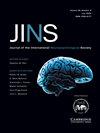Cognitive reserve as residual variance in cognitive performance: Latent dimensionality, correlates, and dementia prediction
IF 2.6
4区 心理学
Q2 CLINICAL NEUROLOGY
Journal of the International Neuropsychological Society
Pub Date : 2024-09-18
DOI:10.1017/s1355617724000353
引用次数: 0
Abstract
Objectives: Cognitive reserve (CR) is typically operationalized as episodic memory residualized on brain health indices. The dimensionality of more generalized models of CR has rarely been examined. Methods: In a sample of认知储备作为认知表现的残差:潜在维度、相关性和痴呆症预测
目的:认知储备(CR)通常被操作化为大脑健康指数上的外显记忆残余。目前还很少有人对更广泛的认知储备模型的维度进行研究。研究方法在 N = 113 位无痴呆症的老年人(磁共振成像扫描时年龄为 62-86 岁;58.4% 为女性)样本中,比较了脑指数(脑容量损失、脑血流量、白质高密度)残余化前后一般认知(COG)的特定领域代表性(即 COG 与 CR)。COG和CR通过15项任务进行评估,这些任务横跨五个领域:处理速度、言语记忆、视觉空间记忆、流体推理和词汇。通过一系列结构因素分析,对测量不变性和项目-结构表征进行了测试。然后研究了COG和CR与22个风险和保护因素以及死亡时痴呆状态的关系。结果显示项目因子载荷不同,CR更强调流体推理。受教育年限越长、职业等级越高、爱好/兴趣越多、个人行动困难越少,也同样预示着COG和CR越好。只有视觉空间记忆子域(残差化之前和之后)与临终前转为痴呆症有关(r = -.30; p = .01)。结论研究结果初步支持了流体推理(智力)作为潜在补偿因素对与年龄和/或神经病理相关的处理速度和记忆力下降的作用。激励智力的工作、保持个人活动能力的努力以及兴趣爱好的多样性可能会减轻痴呆症发病前与年龄和/或病理有关的认知功能下降。
本文章由计算机程序翻译,如有差异,请以英文原文为准。
求助全文
约1分钟内获得全文
求助全文
来源期刊
CiteScore
5.40
自引率
3.80%
发文量
185
审稿时长
4-8 weeks
期刊介绍:
The Journal of the International Neuropsychological Society is the official journal of the International Neuropsychological Society, an organization of over 4,500 international members from a variety of disciplines. The Journal of the International Neuropsychological Society welcomes original, creative, high quality research papers covering all areas of neuropsychology. The focus of articles may be primarily experimental, applied, or clinical. Contributions will broadly reflect the interest of all areas of neuropsychology, including but not limited to: development of cognitive processes, brain-behavior relationships, adult and pediatric neuropsychology, neurobehavioral syndromes (such as aphasia or apraxia), and the interfaces of neuropsychology with related areas such as behavioral neurology, neuropsychiatry, genetics, and cognitive neuroscience. Papers that utilize behavioral, neuroimaging, and electrophysiological measures are appropriate.
To assure maximum flexibility and to promote diverse mechanisms of scholarly communication, the following formats are available in addition to a Regular Research Article: Brief Communication is a shorter research article; Rapid Communication is intended for "fast breaking" new work that does not yet justify a full length article and is placed on a fast review track; Case Report is a theoretically important and unique case study; Critical Review and Short Review are thoughtful considerations of topics of importance to neuropsychology and include meta-analyses; Dialogue provides a forum for publishing two distinct positions on controversial issues in a point-counterpoint format; Special Issue and Special Section consist of several articles linked thematically; Letter to the Editor responds to recent articles published in the Journal of the International Neuropsychological Society; and Book Review, which is considered but is no longer solicited.

 求助内容:
求助内容: 应助结果提醒方式:
应助结果提醒方式:


